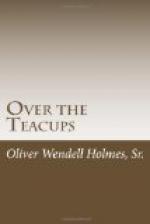Perhaps the next poem, which may be looked for in its proper place, may help us to form a judgment. We may have several verse-writers among us, and if so there will be a good opportunity for the exercise of judgment in distributing their productions among the legitimate claimants. In the mean time, we must not let the love-making and the song-writing interfere with the more serious matters which these papers are expected to contain.
Number Seven’s compendious and comprehensive symbolism proved suggestive, as his whimsical notions often do. It always pleases me to take some hint from anything he says when I can, and carry it out in a direction not unlike that of his own remark. I reminded the company of his enigmatical symbol.
You can divide mankind in the same way, I said. Two words, each of two letters, will serve to distinguish two classes of human beings who constitute the principal divisions of mankind. Can any of you tell what those two words are?
“Give me five letters,” cried Number Seven, “and I can solve your problem! F-o-o-l-s,—those five letters will give you the first and largest half. For the other fraction”—
Oh, but, said I, I restrict you absolutely to two letters. If you are going to take five, you may as well take twenty or a hundred.
After a few attempts, the company gave it up. The nearest approach to the correct answer was Number Five’s guess of Oh and Ah: Oh signifying eternal striving after an ideal, which belongs to one kind of nature; and Ah the satisfaction of the other kind of nature, which rests at ease in what it has attained.
Good! I said to Number Five, but not the answer I am after. The great division between human beings is into the Ifs and the Ases.
“Is the last word to be spelt with one or two s’s?” asked the young Doctor.
The company laughed feebly at this question. I answered it soberly. With one s. There are more foolish people among the Ifs than there are among the Ases.
The company looked puzzled, and asked for an explanation.
This is the meaning of those two words as I interpret them: If it were,—if it might be,—if it could be,—if it had been. One portion of mankind go through life always regretting, always whining, always imagining. These are the people whose backbones remain cartilaginous all their lives long, as do those of certain other vertebrate animals,—the sturgeons, for instance. A good many poets must be classed with this group of vertebrates.




